Nursing Practice in Cases of Isolation: Evidence-Based Approach
VerifiedAdded on 2020/04/13
|8
|1931
|50
Essay
AI Summary
This essay delves into the critical aspects of nursing practice within the context of patient isolation, emphasizing the importance of cultural competence, evidence-based practice, and patient dignity. It highlights the significance of transcultural nursing in delivering quality care to diverse patient populations, acknowledging that cultural beliefs and practices significantly impact patient outcomes. The essay explores the effects of sensory deprivation in isolated settings and outlines effective nursing interventions to mitigate these effects. It underscores the need for nurses to be aware of their own biases and assumptions and to provide care that is fair, impartial, and based on research. Additionally, the essay examines the factors influencing patient dignity and suggests strategies for maintaining it. The conclusion emphasizes the holistic approach required to provide comprehensive and effective care for patients with severe medical conditions, underscoring the crucial role of nurses in promoting patient well-being and safety.
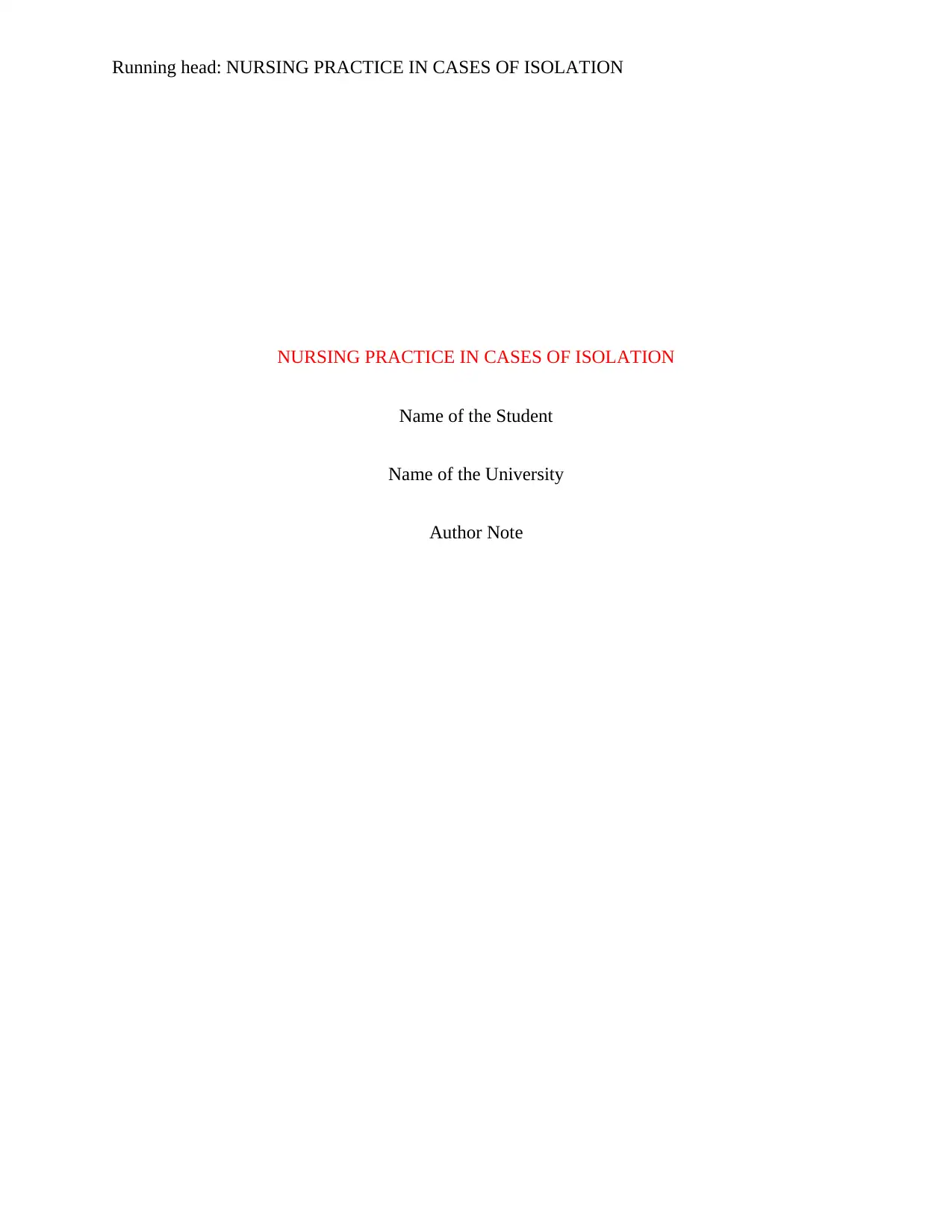
Running head: NURSING PRACTICE IN CASES OF ISOLATION
NURSING PRACTICE IN CASES OF ISOLATION
Name of the Student
Name of the University
Author Note
NURSING PRACTICE IN CASES OF ISOLATION
Name of the Student
Name of the University
Author Note
Paraphrase This Document
Need a fresh take? Get an instant paraphrase of this document with our AI Paraphraser
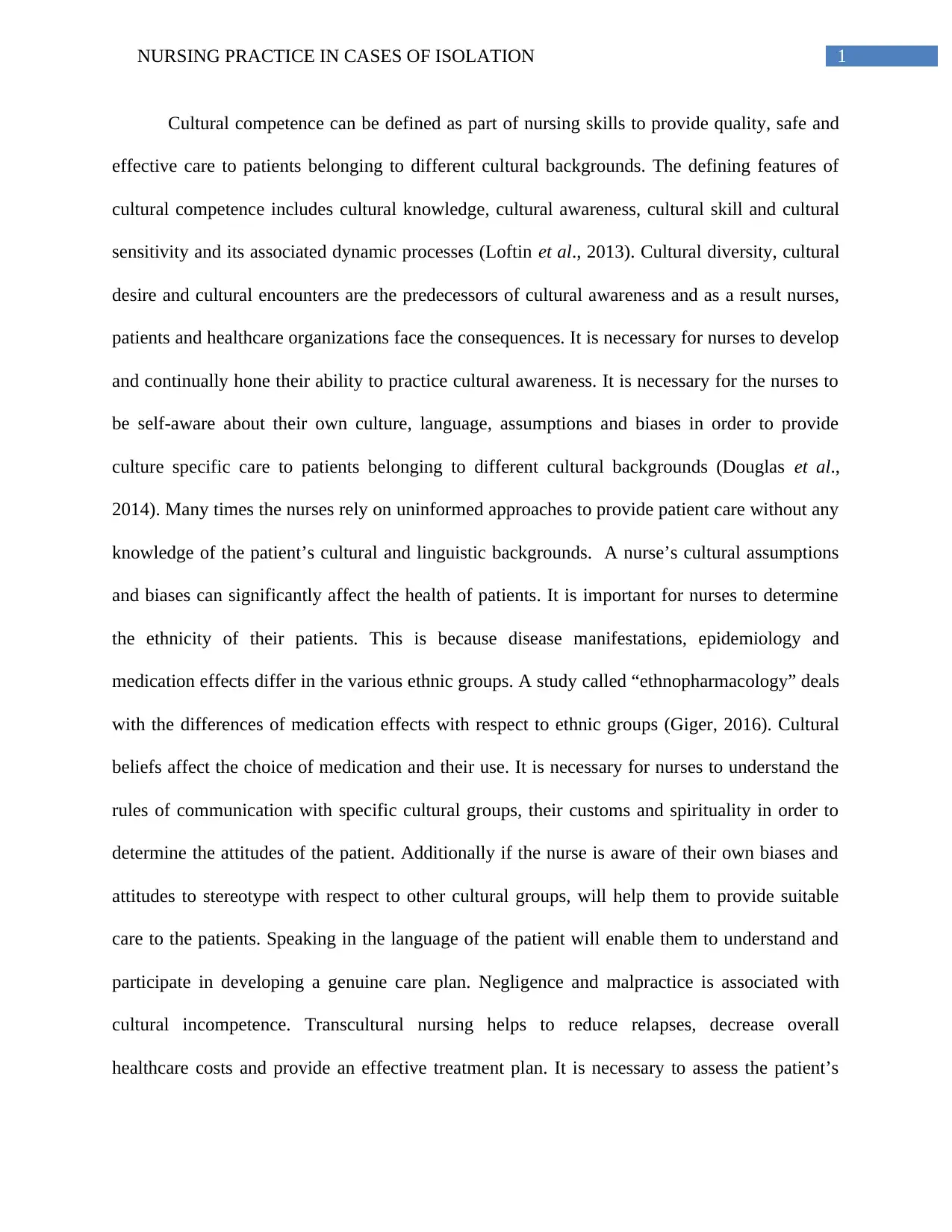
1NURSING PRACTICE IN CASES OF ISOLATION
Cultural competence can be defined as part of nursing skills to provide quality, safe and
effective care to patients belonging to different cultural backgrounds. The defining features of
cultural competence includes cultural knowledge, cultural awareness, cultural skill and cultural
sensitivity and its associated dynamic processes (Loftin et al., 2013). Cultural diversity, cultural
desire and cultural encounters are the predecessors of cultural awareness and as a result nurses,
patients and healthcare organizations face the consequences. It is necessary for nurses to develop
and continually hone their ability to practice cultural awareness. It is necessary for the nurses to
be self-aware about their own culture, language, assumptions and biases in order to provide
culture specific care to patients belonging to different cultural backgrounds (Douglas et al.,
2014). Many times the nurses rely on uninformed approaches to provide patient care without any
knowledge of the patient’s cultural and linguistic backgrounds. A nurse’s cultural assumptions
and biases can significantly affect the health of patients. It is important for nurses to determine
the ethnicity of their patients. This is because disease manifestations, epidemiology and
medication effects differ in the various ethnic groups. A study called “ethnopharmacology” deals
with the differences of medication effects with respect to ethnic groups (Giger, 2016). Cultural
beliefs affect the choice of medication and their use. It is necessary for nurses to understand the
rules of communication with specific cultural groups, their customs and spirituality in order to
determine the attitudes of the patient. Additionally if the nurse is aware of their own biases and
attitudes to stereotype with respect to other cultural groups, will help them to provide suitable
care to the patients. Speaking in the language of the patient will enable them to understand and
participate in developing a genuine care plan. Negligence and malpractice is associated with
cultural incompetence. Transcultural nursing helps to reduce relapses, decrease overall
healthcare costs and provide an effective treatment plan. It is necessary to assess the patient’s
Cultural competence can be defined as part of nursing skills to provide quality, safe and
effective care to patients belonging to different cultural backgrounds. The defining features of
cultural competence includes cultural knowledge, cultural awareness, cultural skill and cultural
sensitivity and its associated dynamic processes (Loftin et al., 2013). Cultural diversity, cultural
desire and cultural encounters are the predecessors of cultural awareness and as a result nurses,
patients and healthcare organizations face the consequences. It is necessary for nurses to develop
and continually hone their ability to practice cultural awareness. It is necessary for the nurses to
be self-aware about their own culture, language, assumptions and biases in order to provide
culture specific care to patients belonging to different cultural backgrounds (Douglas et al.,
2014). Many times the nurses rely on uninformed approaches to provide patient care without any
knowledge of the patient’s cultural and linguistic backgrounds. A nurse’s cultural assumptions
and biases can significantly affect the health of patients. It is important for nurses to determine
the ethnicity of their patients. This is because disease manifestations, epidemiology and
medication effects differ in the various ethnic groups. A study called “ethnopharmacology” deals
with the differences of medication effects with respect to ethnic groups (Giger, 2016). Cultural
beliefs affect the choice of medication and their use. It is necessary for nurses to understand the
rules of communication with specific cultural groups, their customs and spirituality in order to
determine the attitudes of the patient. Additionally if the nurse is aware of their own biases and
attitudes to stereotype with respect to other cultural groups, will help them to provide suitable
care to the patients. Speaking in the language of the patient will enable them to understand and
participate in developing a genuine care plan. Negligence and malpractice is associated with
cultural incompetence. Transcultural nursing helps to reduce relapses, decrease overall
healthcare costs and provide an effective treatment plan. It is necessary to assess the patient’s
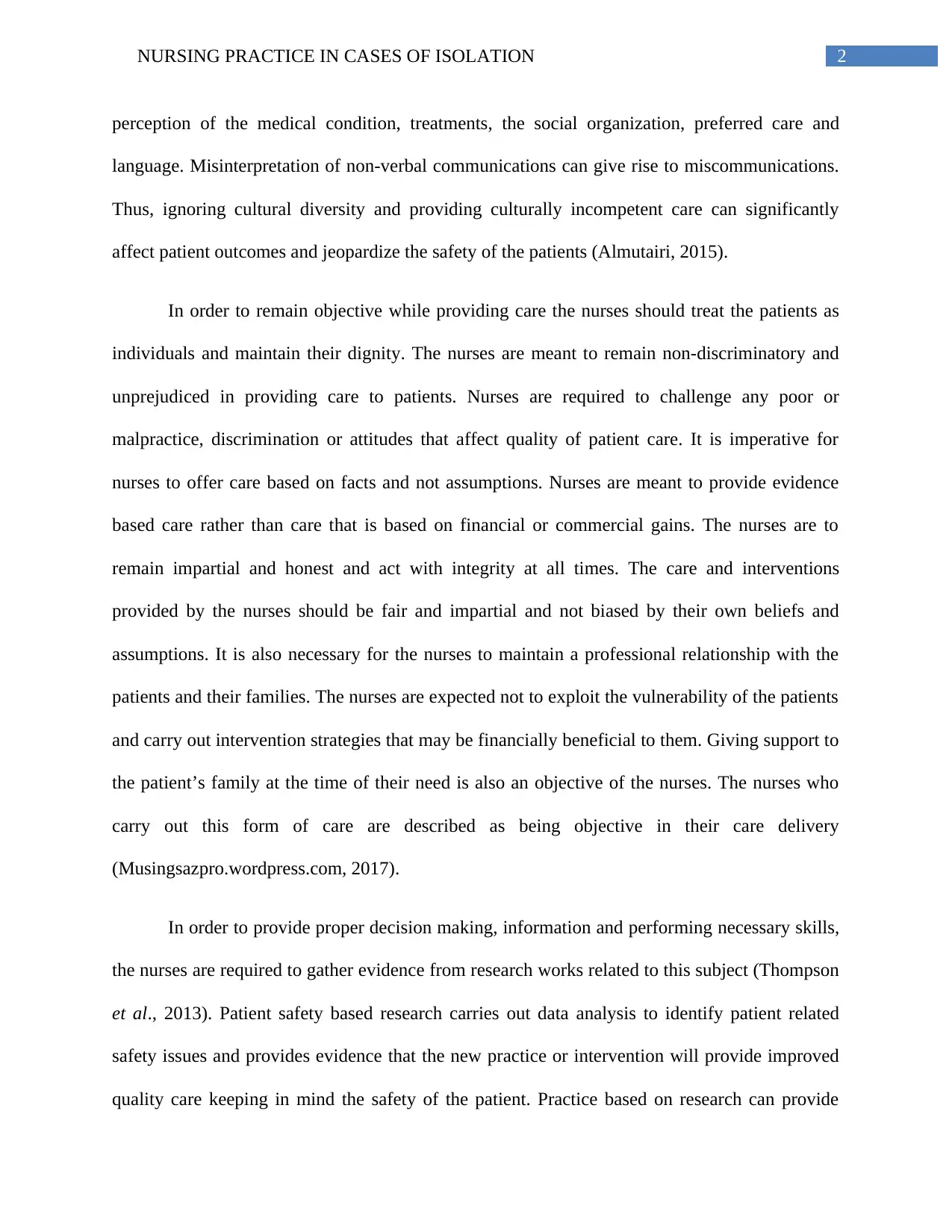
2NURSING PRACTICE IN CASES OF ISOLATION
perception of the medical condition, treatments, the social organization, preferred care and
language. Misinterpretation of non-verbal communications can give rise to miscommunications.
Thus, ignoring cultural diversity and providing culturally incompetent care can significantly
affect patient outcomes and jeopardize the safety of the patients (Almutairi, 2015).
In order to remain objective while providing care the nurses should treat the patients as
individuals and maintain their dignity. The nurses are meant to remain non-discriminatory and
unprejudiced in providing care to patients. Nurses are required to challenge any poor or
malpractice, discrimination or attitudes that affect quality of patient care. It is imperative for
nurses to offer care based on facts and not assumptions. Nurses are meant to provide evidence
based care rather than care that is based on financial or commercial gains. The nurses are to
remain impartial and honest and act with integrity at all times. The care and interventions
provided by the nurses should be fair and impartial and not biased by their own beliefs and
assumptions. It is also necessary for the nurses to maintain a professional relationship with the
patients and their families. The nurses are expected not to exploit the vulnerability of the patients
and carry out intervention strategies that may be financially beneficial to them. Giving support to
the patient’s family at the time of their need is also an objective of the nurses. The nurses who
carry out this form of care are described as being objective in their care delivery
(Musingsazpro.wordpress.com, 2017).
In order to provide proper decision making, information and performing necessary skills,
the nurses are required to gather evidence from research works related to this subject (Thompson
et al., 2013). Patient safety based research carries out data analysis to identify patient related
safety issues and provides evidence that the new practice or intervention will provide improved
quality care keeping in mind the safety of the patient. Practice based on research can provide
perception of the medical condition, treatments, the social organization, preferred care and
language. Misinterpretation of non-verbal communications can give rise to miscommunications.
Thus, ignoring cultural diversity and providing culturally incompetent care can significantly
affect patient outcomes and jeopardize the safety of the patients (Almutairi, 2015).
In order to remain objective while providing care the nurses should treat the patients as
individuals and maintain their dignity. The nurses are meant to remain non-discriminatory and
unprejudiced in providing care to patients. Nurses are required to challenge any poor or
malpractice, discrimination or attitudes that affect quality of patient care. It is imperative for
nurses to offer care based on facts and not assumptions. Nurses are meant to provide evidence
based care rather than care that is based on financial or commercial gains. The nurses are to
remain impartial and honest and act with integrity at all times. The care and interventions
provided by the nurses should be fair and impartial and not biased by their own beliefs and
assumptions. It is also necessary for the nurses to maintain a professional relationship with the
patients and their families. The nurses are expected not to exploit the vulnerability of the patients
and carry out intervention strategies that may be financially beneficial to them. Giving support to
the patient’s family at the time of their need is also an objective of the nurses. The nurses who
carry out this form of care are described as being objective in their care delivery
(Musingsazpro.wordpress.com, 2017).
In order to provide proper decision making, information and performing necessary skills,
the nurses are required to gather evidence from research works related to this subject (Thompson
et al., 2013). Patient safety based research carries out data analysis to identify patient related
safety issues and provides evidence that the new practice or intervention will provide improved
quality care keeping in mind the safety of the patient. Practice based on research can provide
⊘ This is a preview!⊘
Do you want full access?
Subscribe today to unlock all pages.

Trusted by 1+ million students worldwide
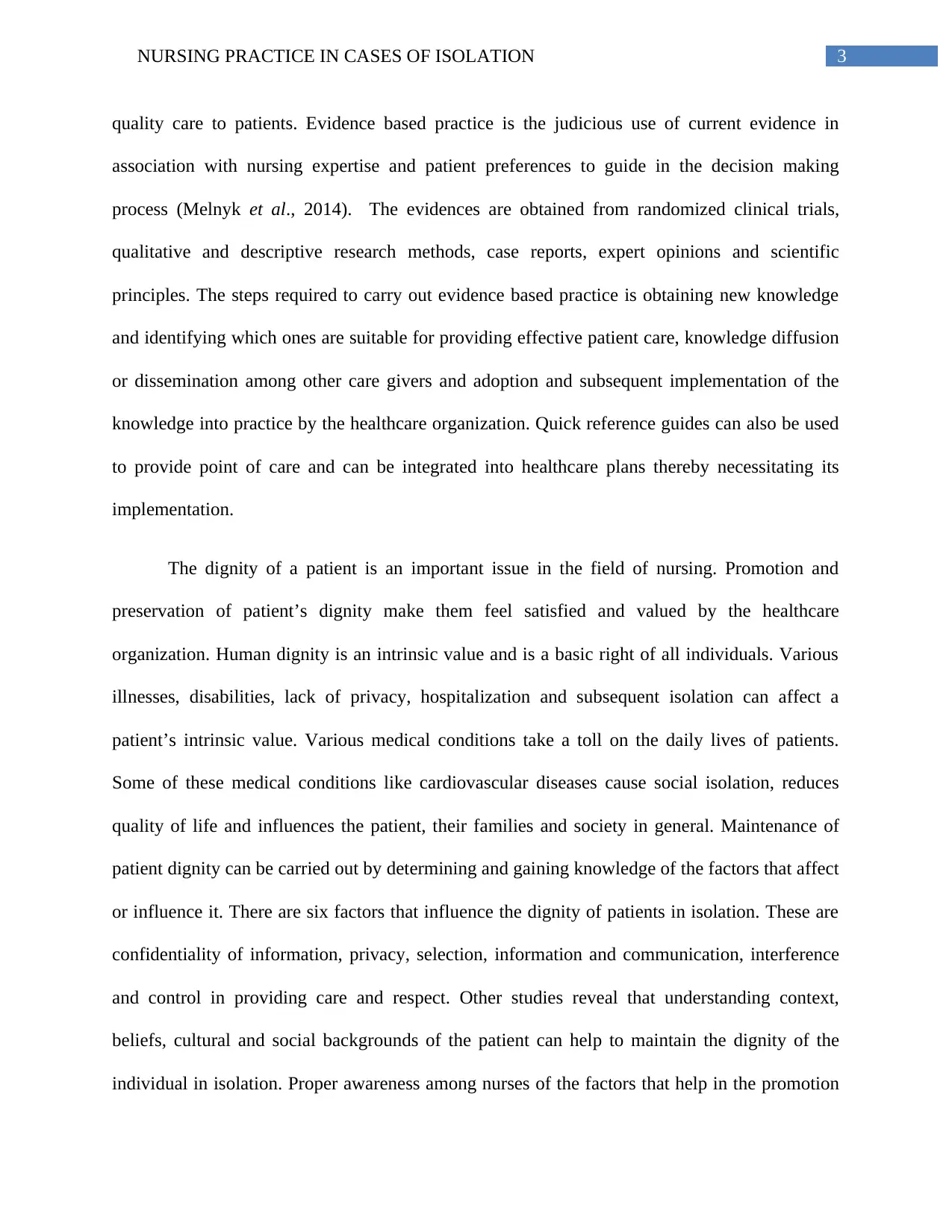
3NURSING PRACTICE IN CASES OF ISOLATION
quality care to patients. Evidence based practice is the judicious use of current evidence in
association with nursing expertise and patient preferences to guide in the decision making
process (Melnyk et al., 2014). The evidences are obtained from randomized clinical trials,
qualitative and descriptive research methods, case reports, expert opinions and scientific
principles. The steps required to carry out evidence based practice is obtaining new knowledge
and identifying which ones are suitable for providing effective patient care, knowledge diffusion
or dissemination among other care givers and adoption and subsequent implementation of the
knowledge into practice by the healthcare organization. Quick reference guides can also be used
to provide point of care and can be integrated into healthcare plans thereby necessitating its
implementation.
The dignity of a patient is an important issue in the field of nursing. Promotion and
preservation of patient’s dignity make them feel satisfied and valued by the healthcare
organization. Human dignity is an intrinsic value and is a basic right of all individuals. Various
illnesses, disabilities, lack of privacy, hospitalization and subsequent isolation can affect a
patient’s intrinsic value. Various medical conditions take a toll on the daily lives of patients.
Some of these medical conditions like cardiovascular diseases cause social isolation, reduces
quality of life and influences the patient, their families and society in general. Maintenance of
patient dignity can be carried out by determining and gaining knowledge of the factors that affect
or influence it. There are six factors that influence the dignity of patients in isolation. These are
confidentiality of information, privacy, selection, information and communication, interference
and control in providing care and respect. Other studies reveal that understanding context,
beliefs, cultural and social backgrounds of the patient can help to maintain the dignity of the
individual in isolation. Proper awareness among nurses of the factors that help in the promotion
quality care to patients. Evidence based practice is the judicious use of current evidence in
association with nursing expertise and patient preferences to guide in the decision making
process (Melnyk et al., 2014). The evidences are obtained from randomized clinical trials,
qualitative and descriptive research methods, case reports, expert opinions and scientific
principles. The steps required to carry out evidence based practice is obtaining new knowledge
and identifying which ones are suitable for providing effective patient care, knowledge diffusion
or dissemination among other care givers and adoption and subsequent implementation of the
knowledge into practice by the healthcare organization. Quick reference guides can also be used
to provide point of care and can be integrated into healthcare plans thereby necessitating its
implementation.
The dignity of a patient is an important issue in the field of nursing. Promotion and
preservation of patient’s dignity make them feel satisfied and valued by the healthcare
organization. Human dignity is an intrinsic value and is a basic right of all individuals. Various
illnesses, disabilities, lack of privacy, hospitalization and subsequent isolation can affect a
patient’s intrinsic value. Various medical conditions take a toll on the daily lives of patients.
Some of these medical conditions like cardiovascular diseases cause social isolation, reduces
quality of life and influences the patient, their families and society in general. Maintenance of
patient dignity can be carried out by determining and gaining knowledge of the factors that affect
or influence it. There are six factors that influence the dignity of patients in isolation. These are
confidentiality of information, privacy, selection, information and communication, interference
and control in providing care and respect. Other studies reveal that understanding context,
beliefs, cultural and social backgrounds of the patient can help to maintain the dignity of the
individual in isolation. Proper awareness among nurses of the factors that help in the promotion
Paraphrase This Document
Need a fresh take? Get an instant paraphrase of this document with our AI Paraphraser
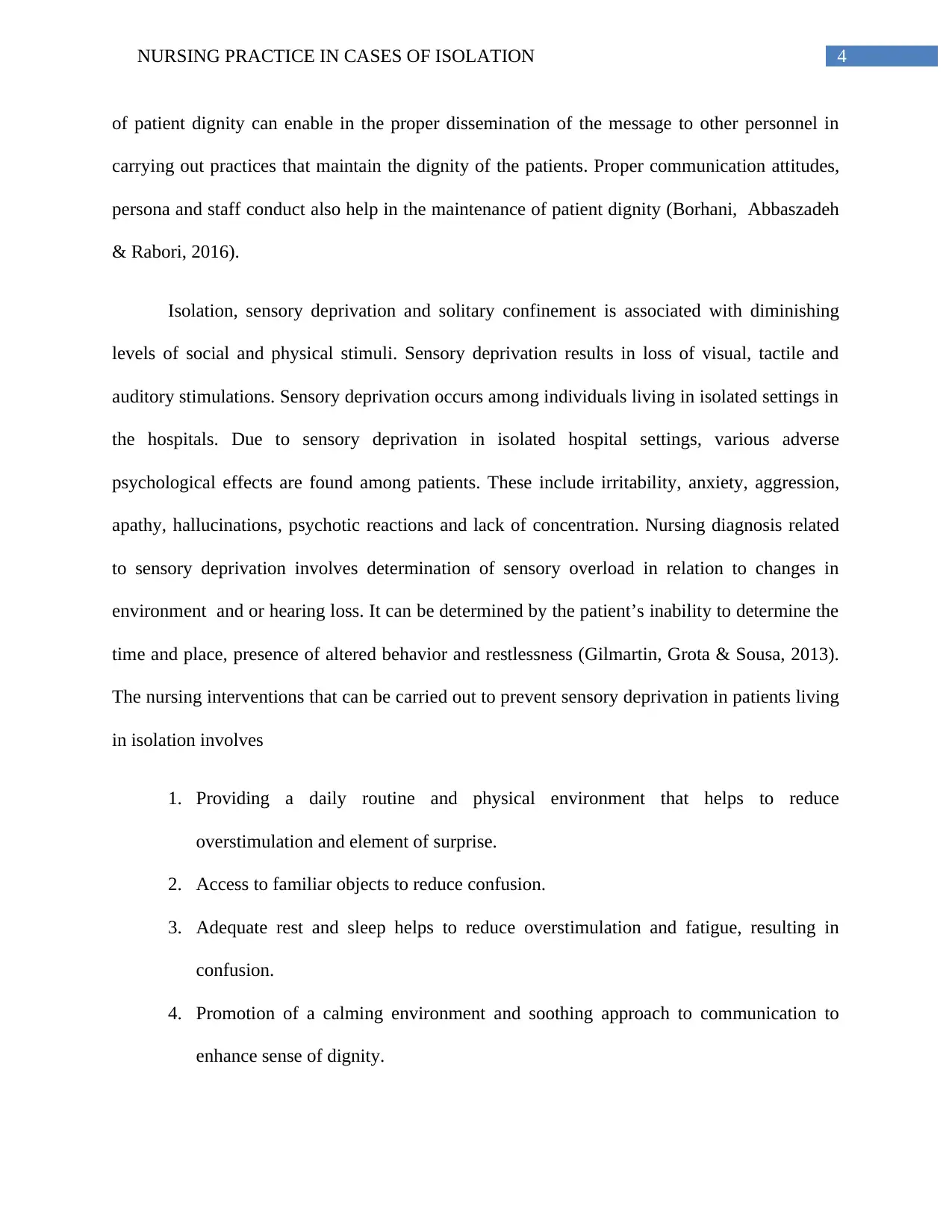
4NURSING PRACTICE IN CASES OF ISOLATION
of patient dignity can enable in the proper dissemination of the message to other personnel in
carrying out practices that maintain the dignity of the patients. Proper communication attitudes,
persona and staff conduct also help in the maintenance of patient dignity (Borhani, Abbaszadeh
& Rabori, 2016).
Isolation, sensory deprivation and solitary confinement is associated with diminishing
levels of social and physical stimuli. Sensory deprivation results in loss of visual, tactile and
auditory stimulations. Sensory deprivation occurs among individuals living in isolated settings in
the hospitals. Due to sensory deprivation in isolated hospital settings, various adverse
psychological effects are found among patients. These include irritability, anxiety, aggression,
apathy, hallucinations, psychotic reactions and lack of concentration. Nursing diagnosis related
to sensory deprivation involves determination of sensory overload in relation to changes in
environment and or hearing loss. It can be determined by the patient’s inability to determine the
time and place, presence of altered behavior and restlessness (Gilmartin, Grota & Sousa, 2013).
The nursing interventions that can be carried out to prevent sensory deprivation in patients living
in isolation involves
1. Providing a daily routine and physical environment that helps to reduce
overstimulation and element of surprise.
2. Access to familiar objects to reduce confusion.
3. Adequate rest and sleep helps to reduce overstimulation and fatigue, resulting in
confusion.
4. Promotion of a calming environment and soothing approach to communication to
enhance sense of dignity.
of patient dignity can enable in the proper dissemination of the message to other personnel in
carrying out practices that maintain the dignity of the patients. Proper communication attitudes,
persona and staff conduct also help in the maintenance of patient dignity (Borhani, Abbaszadeh
& Rabori, 2016).
Isolation, sensory deprivation and solitary confinement is associated with diminishing
levels of social and physical stimuli. Sensory deprivation results in loss of visual, tactile and
auditory stimulations. Sensory deprivation occurs among individuals living in isolated settings in
the hospitals. Due to sensory deprivation in isolated hospital settings, various adverse
psychological effects are found among patients. These include irritability, anxiety, aggression,
apathy, hallucinations, psychotic reactions and lack of concentration. Nursing diagnosis related
to sensory deprivation involves determination of sensory overload in relation to changes in
environment and or hearing loss. It can be determined by the patient’s inability to determine the
time and place, presence of altered behavior and restlessness (Gilmartin, Grota & Sousa, 2013).
The nursing interventions that can be carried out to prevent sensory deprivation in patients living
in isolation involves
1. Providing a daily routine and physical environment that helps to reduce
overstimulation and element of surprise.
2. Access to familiar objects to reduce confusion.
3. Adequate rest and sleep helps to reduce overstimulation and fatigue, resulting in
confusion.
4. Promotion of a calming environment and soothing approach to communication to
enhance sense of dignity.
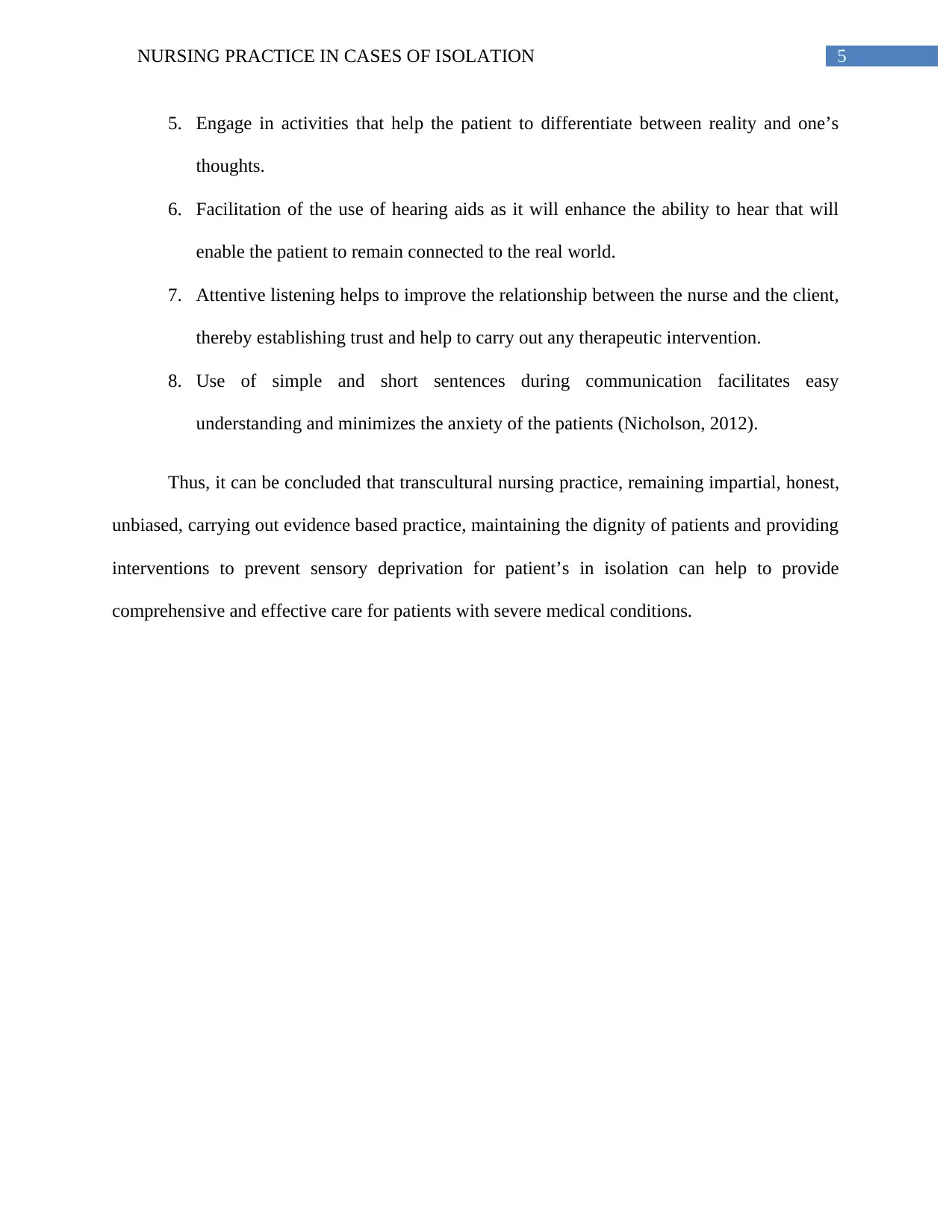
5NURSING PRACTICE IN CASES OF ISOLATION
5. Engage in activities that help the patient to differentiate between reality and one’s
thoughts.
6. Facilitation of the use of hearing aids as it will enhance the ability to hear that will
enable the patient to remain connected to the real world.
7. Attentive listening helps to improve the relationship between the nurse and the client,
thereby establishing trust and help to carry out any therapeutic intervention.
8. Use of simple and short sentences during communication facilitates easy
understanding and minimizes the anxiety of the patients (Nicholson, 2012).
Thus, it can be concluded that transcultural nursing practice, remaining impartial, honest,
unbiased, carrying out evidence based practice, maintaining the dignity of patients and providing
interventions to prevent sensory deprivation for patient’s in isolation can help to provide
comprehensive and effective care for patients with severe medical conditions.
5. Engage in activities that help the patient to differentiate between reality and one’s
thoughts.
6. Facilitation of the use of hearing aids as it will enhance the ability to hear that will
enable the patient to remain connected to the real world.
7. Attentive listening helps to improve the relationship between the nurse and the client,
thereby establishing trust and help to carry out any therapeutic intervention.
8. Use of simple and short sentences during communication facilitates easy
understanding and minimizes the anxiety of the patients (Nicholson, 2012).
Thus, it can be concluded that transcultural nursing practice, remaining impartial, honest,
unbiased, carrying out evidence based practice, maintaining the dignity of patients and providing
interventions to prevent sensory deprivation for patient’s in isolation can help to provide
comprehensive and effective care for patients with severe medical conditions.
⊘ This is a preview!⊘
Do you want full access?
Subscribe today to unlock all pages.

Trusted by 1+ million students worldwide
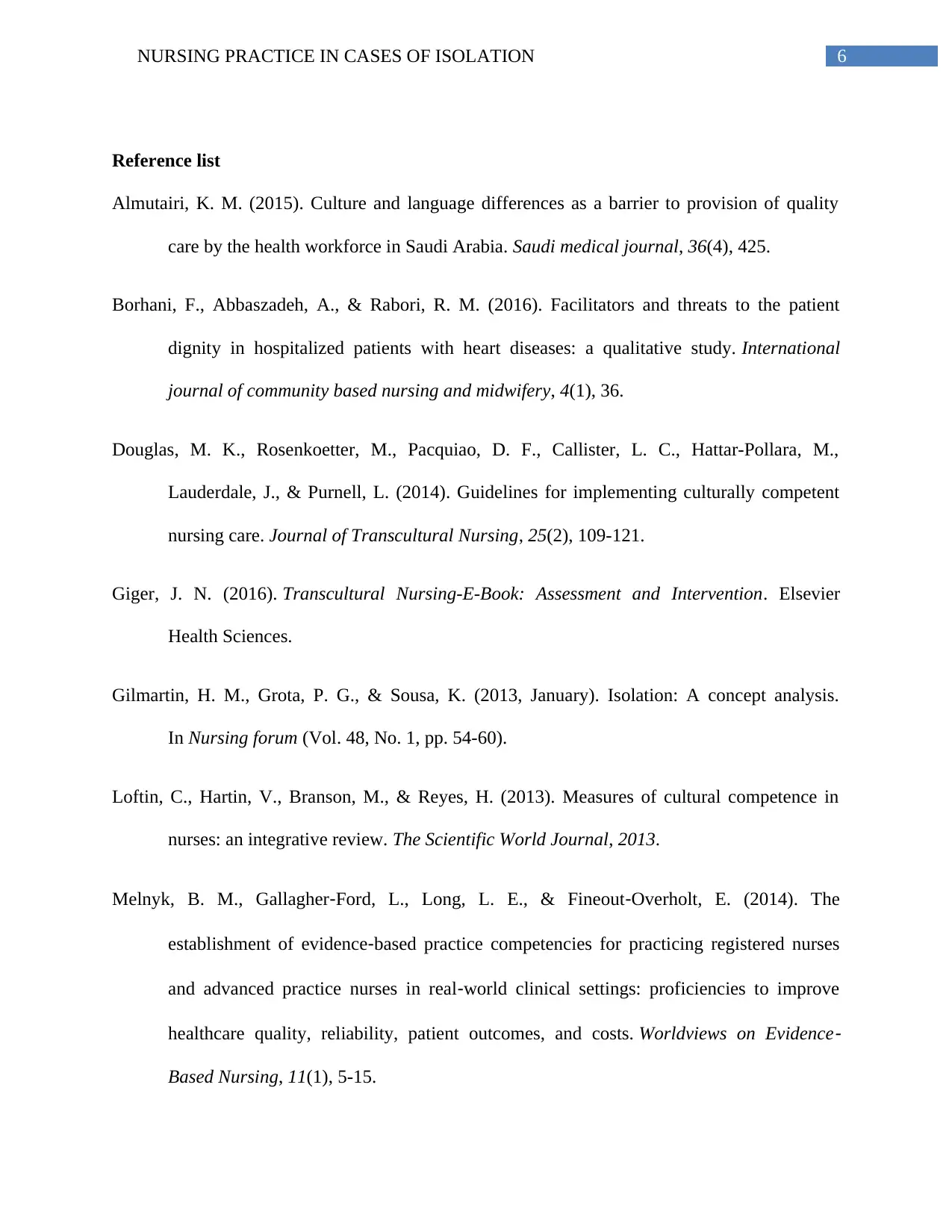
6NURSING PRACTICE IN CASES OF ISOLATION
Reference list
Almutairi, K. M. (2015). Culture and language differences as a barrier to provision of quality
care by the health workforce in Saudi Arabia. Saudi medical journal, 36(4), 425.
Borhani, F., Abbaszadeh, A., & Rabori, R. M. (2016). Facilitators and threats to the patient
dignity in hospitalized patients with heart diseases: a qualitative study. International
journal of community based nursing and midwifery, 4(1), 36.
Douglas, M. K., Rosenkoetter, M., Pacquiao, D. F., Callister, L. C., Hattar-Pollara, M.,
Lauderdale, J., & Purnell, L. (2014). Guidelines for implementing culturally competent
nursing care. Journal of Transcultural Nursing, 25(2), 109-121.
Giger, J. N. (2016). Transcultural Nursing-E-Book: Assessment and Intervention. Elsevier
Health Sciences.
Gilmartin, H. M., Grota, P. G., & Sousa, K. (2013, January). Isolation: A concept analysis.
In Nursing forum (Vol. 48, No. 1, pp. 54-60).
Loftin, C., Hartin, V., Branson, M., & Reyes, H. (2013). Measures of cultural competence in
nurses: an integrative review. The Scientific World Journal, 2013.
Melnyk, B. M., Gallagher‐Ford, L., Long, L. E., & Fineout‐Overholt, E. (2014). The
establishment of evidence‐based practice competencies for practicing registered nurses
and advanced practice nurses in real‐world clinical settings: proficiencies to improve
healthcare quality, reliability, patient outcomes, and costs. Worldviews on Evidence
‐
Based Nursing, 11(1), 5-15.
Reference list
Almutairi, K. M. (2015). Culture and language differences as a barrier to provision of quality
care by the health workforce in Saudi Arabia. Saudi medical journal, 36(4), 425.
Borhani, F., Abbaszadeh, A., & Rabori, R. M. (2016). Facilitators and threats to the patient
dignity in hospitalized patients with heart diseases: a qualitative study. International
journal of community based nursing and midwifery, 4(1), 36.
Douglas, M. K., Rosenkoetter, M., Pacquiao, D. F., Callister, L. C., Hattar-Pollara, M.,
Lauderdale, J., & Purnell, L. (2014). Guidelines for implementing culturally competent
nursing care. Journal of Transcultural Nursing, 25(2), 109-121.
Giger, J. N. (2016). Transcultural Nursing-E-Book: Assessment and Intervention. Elsevier
Health Sciences.
Gilmartin, H. M., Grota, P. G., & Sousa, K. (2013, January). Isolation: A concept analysis.
In Nursing forum (Vol. 48, No. 1, pp. 54-60).
Loftin, C., Hartin, V., Branson, M., & Reyes, H. (2013). Measures of cultural competence in
nurses: an integrative review. The Scientific World Journal, 2013.
Melnyk, B. M., Gallagher‐Ford, L., Long, L. E., & Fineout‐Overholt, E. (2014). The
establishment of evidence‐based practice competencies for practicing registered nurses
and advanced practice nurses in real‐world clinical settings: proficiencies to improve
healthcare quality, reliability, patient outcomes, and costs. Worldviews on Evidence
‐
Based Nursing, 11(1), 5-15.
Paraphrase This Document
Need a fresh take? Get an instant paraphrase of this document with our AI Paraphraser
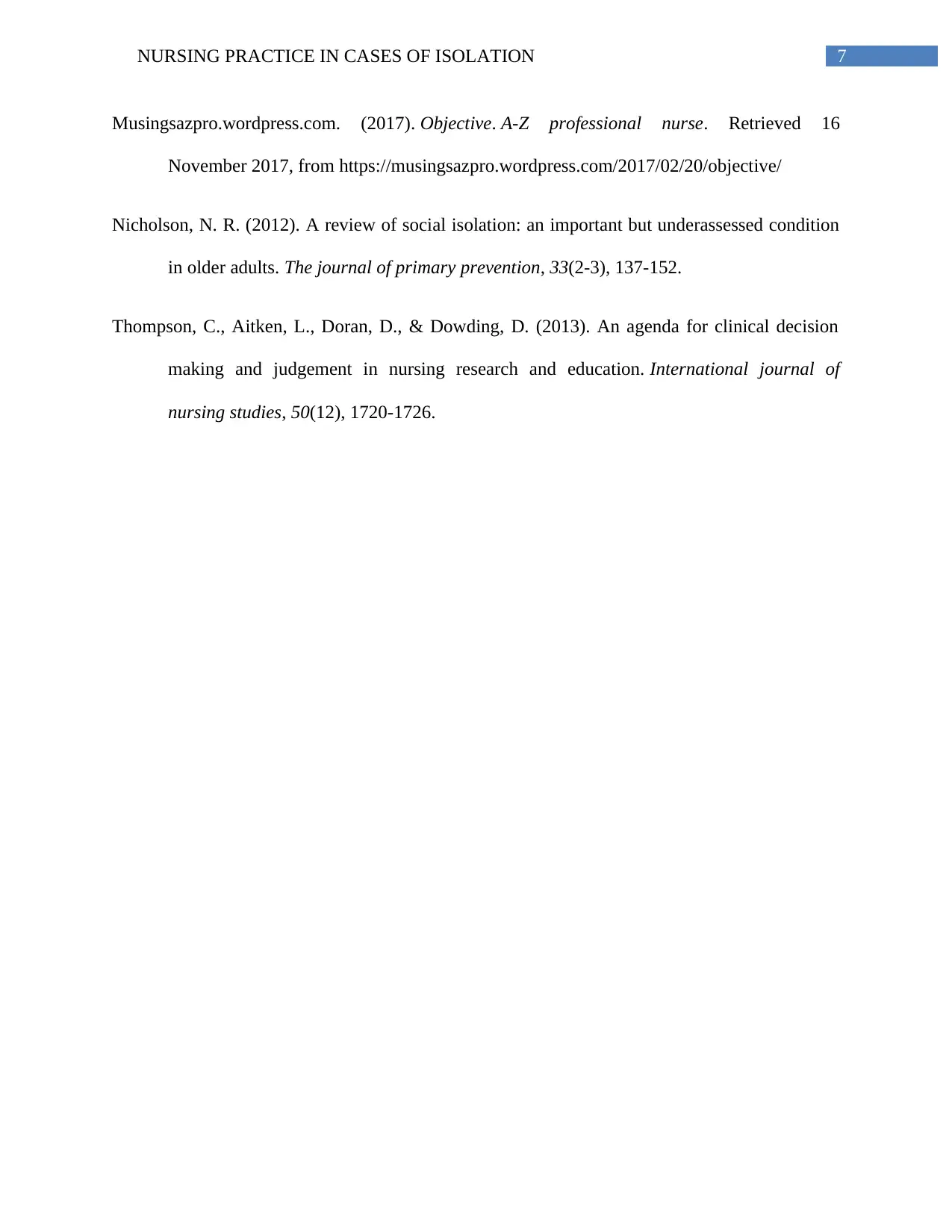
7NURSING PRACTICE IN CASES OF ISOLATION
Musingsazpro.wordpress.com. (2017). Objective. A-Z professional nurse. Retrieved 16
November 2017, from https://musingsazpro.wordpress.com/2017/02/20/objective/
Nicholson, N. R. (2012). A review of social isolation: an important but underassessed condition
in older adults. The journal of primary prevention, 33(2-3), 137-152.
Thompson, C., Aitken, L., Doran, D., & Dowding, D. (2013). An agenda for clinical decision
making and judgement in nursing research and education. International journal of
nursing studies, 50(12), 1720-1726.
Musingsazpro.wordpress.com. (2017). Objective. A-Z professional nurse. Retrieved 16
November 2017, from https://musingsazpro.wordpress.com/2017/02/20/objective/
Nicholson, N. R. (2012). A review of social isolation: an important but underassessed condition
in older adults. The journal of primary prevention, 33(2-3), 137-152.
Thompson, C., Aitken, L., Doran, D., & Dowding, D. (2013). An agenda for clinical decision
making and judgement in nursing research and education. International journal of
nursing studies, 50(12), 1720-1726.
1 out of 8
Related Documents
Your All-in-One AI-Powered Toolkit for Academic Success.
+13062052269
info@desklib.com
Available 24*7 on WhatsApp / Email
![[object Object]](/_next/static/media/star-bottom.7253800d.svg)
Unlock your academic potential
Copyright © 2020–2026 A2Z Services. All Rights Reserved. Developed and managed by ZUCOL.





